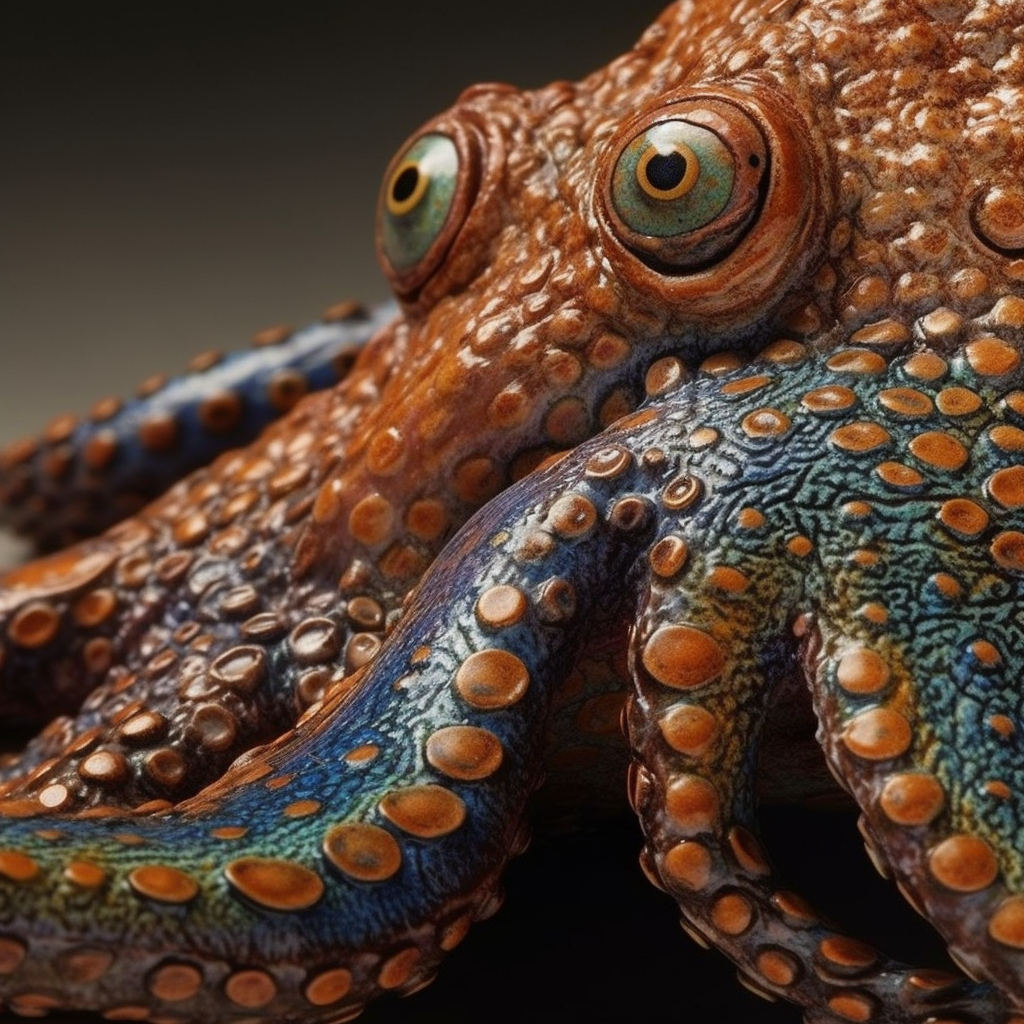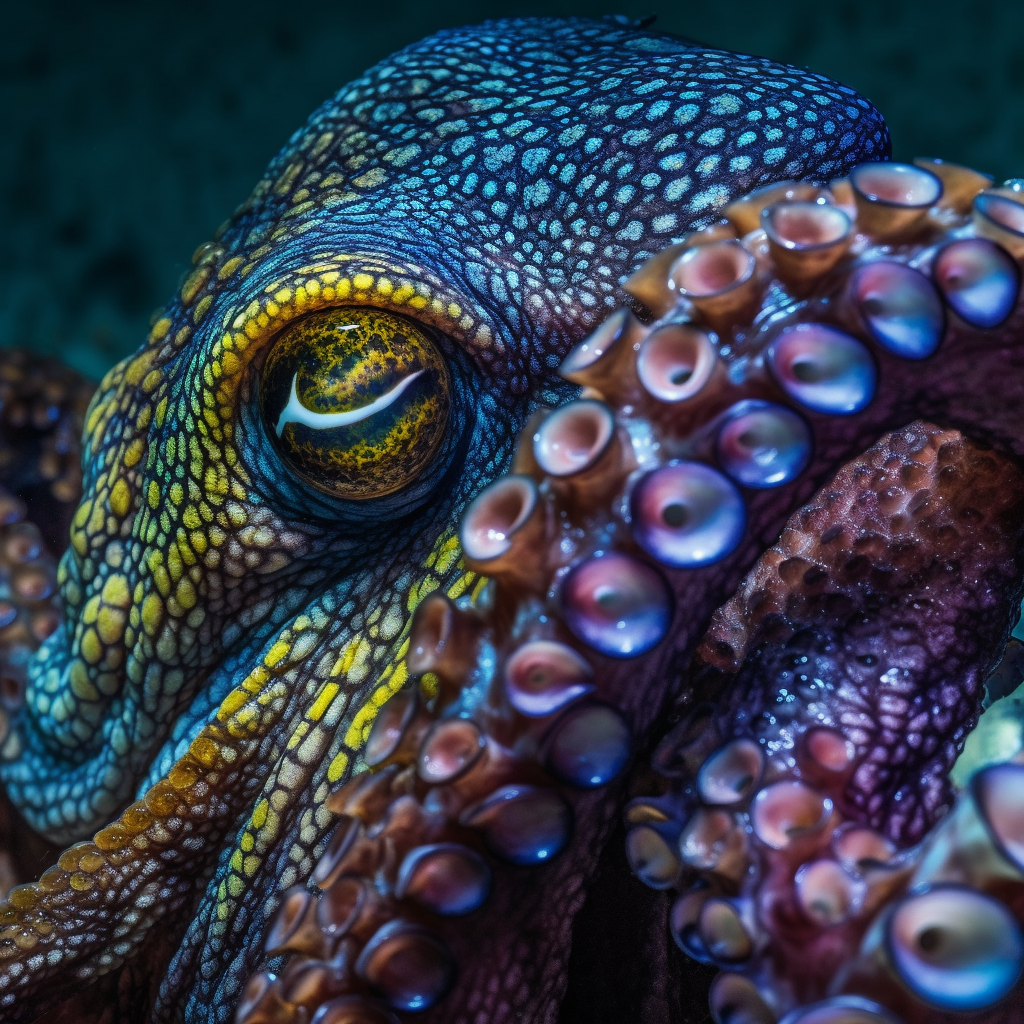Octopus is a fascinating creature that inhabits the depths of the ocean. Known for its unique appearance and remarkable intelligence, it is often a subject of curiosity for many. One question that frequently arises is whether octopus is a good source of protein. Protein is an essential macronutrient that plays a crucial role in our overall health and well-being. In this article, we will explore the protein content of octopus and discuss its nutritional value. So, if you’re curious to know whether octopus can be a protein-rich addition to your diet, keep reading to find out more.
Key Takeaways
- Octopus is a good source of protein.
- It contains all essential amino acids.
- Including octopus in your diet can help meet your protein needs.
The Nutritional Profile of Octopus
Octopus is a fascinating creature that not only captivates us with its unique appearance and intelligence but also offers a range of nutritional benefits. If you’re wondering whether octopus has protein, the answer is a resounding yes! In fact, octopus is a fantastic source of protein, making it a valuable addition to any diet.
Octopus: A Protein Powerhouse
Protein is an essential macronutrient that plays a crucial role in our overall health and well-being. It is responsible for building and repairing tissues, producing enzymes and hormones, and supporting a healthy immune system. Including protein-rich foods in our diet is vital, and octopus is an excellent choice.
When it comes to protein content, octopus is a standout among seafood options. It is packed with high-quality protein, which means it contains all the essential amino acids our bodies need. A 3-ounce serving of octopus provides approximately 25 grams of protein, making it an excellent protein source for those looking to meet their daily requirements.
Octopus: A Nutritional Powerhouse
Protein isn’t the only nutritional benefit that octopus offers. It is also a rich source of other essential nutrients that contribute to our overall health. Let’s take a closer look at the nutritional profile of octopus:
Vitamins and Minerals
Octopus is a good source of vitamins and minerals that are essential for various bodily functions. It contains vitamins B12, B6, and niacin, which play a crucial role in energy production, brain function, and the formation of red blood cells. Additionally, octopus is rich in minerals such as iron, zinc, and selenium, which are important for immune function, metabolism, and antioxidant defense.
Omega-3 Fatty Acids
Omega-3 fatty acids are a type of healthy fat that our bodies need but cannot produce on their own. These fatty acids have been linked to numerous health benefits, including reducing inflammation, improving heart health, and supporting brain function. Octopus is a good source of omega-3 fatty acids, particularly docosahexaenoic acid (DHA), which is known for its role in brain health.
Incorporating Octopus into Your Diet
Now that we know about the nutritional value of octopus, you might be wondering how to incorporate it into your diet. Octopus can be prepared in various ways, including grilling, boiling, or sautéing. It is often used in Mediterranean and Asian cuisines, where it is featured in dishes like octopus salad, grilled octopus, and stir-fried octopus.
When purchasing octopus, it’s essential to choose fresh, high-quality seafood. Look for octopus that has a firm texture, a mild oceanic smell, and bright, clear eyes. If you’re unsure about preparing octopus at home, you can also enjoy it at seafood restaurants that specialize in serving this delicacy.
The Bottom Line
Octopus is not only a fascinating creature of the sea but also a nutritional powerhouse. With its high protein content, along with vitamins, minerals, and omega-3 fatty acids, octopus offers a range of health benefits. So, whether you’re a seafood lover or looking to diversify your protein sources, consider adding octopus to your diet. It’s a delicious and nutritious choice that can contribute to your overall well-being.
Comparing Octopus and Squid Protein Content

When it comes to seafood, octopus and squid are two popular choices. Both creatures belong to the cephalopod family and offer a unique taste and texture. But how do they compare in terms of protein content? Let’s take a closer look.
Octopus Protein Content
Octopus is a fantastic source of protein. Protein is an essential nutrient that plays a crucial role in building and repairing tissues, supporting the immune system, and maintaining overall health. Octopus meat is particularly rich in protein, making it an excellent choice for those looking to increase their protein intake.
On average, octopus contains around 25 grams of protein per 100 grams of meat. This protein content is comparable to other high-protein foods like chicken and beef. Incorporating octopus into your diet can be a great way to diversify your protein sources and enjoy a delicious seafood option.
Squid Protein Content
Squid, like octopus, is also a protein powerhouse. It offers a similar protein content to octopus, with around 25 grams of protein per 100 grams of meat. This makes squid an excellent choice for individuals looking to boost their protein intake while enjoying a flavorful seafood dish.
Squid meat is lean and low in fat, making it a healthy protein option. It is also rich in essential amino acids, which are the building blocks of protein. These amino acids are vital for various bodily functions, including muscle growth and repair.
Nutritional Benefits
Both octopus and squid offer more than just protein. They are also excellent sources of other essential nutrients. These include vitamins such as vitamin B12, vitamin E, and vitamin K, as well as minerals like iron, zinc, and selenium.
Octopus and squid are low in calories and fat, making them a healthy choice for those watching their weight. They are also low in carbohydrates, which can be beneficial for individuals following a low-carb or ketogenic diet.
Incorporating Octopus and Squid into Your Diet
Now that we know octopus and squid are both protein-rich seafood options, how can we incorporate them into our diet? Here are a few ideas:
- Grilled Octopus or Squid: Marinate the seafood in your favorite herbs and spices, then grill it for a delicious and healthy meal.
- Seafood Stir-Fry: Add octopus or squid to a stir-fry with fresh vegetables for a protein-packed and flavorful dish.
- Seafood Salad: Combine octopus or squid with mixed greens, cherry tomatoes, and a light dressing for a refreshing and nutritious salad.
- Seafood Pasta: Toss cooked octopus or squid with whole wheat pasta, garlic, olive oil, and fresh herbs for a satisfying and protein-rich meal.
By incorporating octopus and squid into your diet, you can enjoy their protein content along with a range of other essential nutrients. Remember to cook them properly to ensure optimal taste and texture.
In conclusion, both octopus and squid are excellent sources of protein. They offer a comparable protein content to other high-protein foods and provide a range of other essential nutrients. So, the next time you’re looking for a protein-rich seafood option, consider adding octopus or squid to your menu.
The Protein Content of Octopus in Different Forms
Octopus is a fascinating creature that not only captivates us with its unique appearance and intelligence but also offers a range of nutritional benefits. One of the key aspects of octopus nutrition is its protein content. Protein is an essential macronutrient that plays a crucial role in various bodily functions, including muscle growth and repair, enzyme production, and hormone synthesis. In this section, we will explore the protein content of octopus in different forms and its significance in our diet.
Octopus Nutritional Value
Before delving into the protein content of octopus, let’s take a quick look at its overall nutritional value. Octopus is a low-calorie, low-fat seafood option that is rich in vitamins and minerals. It is an excellent source of vitamins B12 and B6, which are essential for brain health and the production of red blood cells. Octopus also contains minerals like iron, zinc, and selenium, which are vital for various bodily functions.
Protein Content in Octopus
Octopus is known for its relatively high protein content, making it a valuable addition to a protein-rich diet. The exact protein content may vary depending on the species of octopus and its preparation method. On average, a 3-ounce serving of cooked octopus provides approximately 25 grams of protein. This amount can contribute significantly to your daily protein requirements.
Octopus Diet and Protein Quality
The protein found in octopus is considered high-quality protein. High-quality proteins contain all the essential amino acids that our bodies need but cannot produce on their own. These amino acids are crucial for building and repairing tissues, supporting immune function, and maintaining overall health. Octopus protein is easily digestible, making it an excellent choice for individuals with digestive sensitivities.
Health Benefits of Octopus Protein
Including octopus in your diet can offer several health benefits beyond its protein content. The combination of protein and other nutrients found in octopus can support muscle growth and repair, aid in weight management, and promote overall well-being. Additionally, the high levels of vitamin B12 in octopus can help maintain healthy nerve cells and prevent certain types of anemia.
Protein Sources and Octopus as a Protein Source
When it comes to protein sources, many people often think of meat, poultry, and legumes. However, seafood, including octopus, is an often overlooked but valuable source of protein. Octopus provides a lean, low-fat protein option that can be a great alternative to traditional protein sources. Its unique taste and texture make it a versatile ingredient that can be enjoyed in various dishes.
Incorporating Octopus into Your Diet
If you’re interested in incorporating octopus into your diet, there are numerous delicious ways to enjoy this seafood delicacy. Octopus can be grilled, boiled, or sautéed and used in salads, stir-fries, or even as a topping for pizzas. Its mild flavor pairs well with a variety of ingredients, allowing you to experiment and create exciting culinary experiences.
Conclusion
Octopus is not only a visually intriguing creature but also a protein-rich seafood option that offers a range of health benefits. Its high-quality protein content, combined with essential vitamins and minerals, makes it a valuable addition to a balanced diet. Whether you’re a seafood enthusiast or looking to diversify your protein sources, consider incorporating octopus into your meals for a nutritious and flavorful experience.
Octopus vs. Other Protein Sources

When it comes to protein sources, many people immediately think of traditional options like chicken, beef, or fish. However, there are several alternative protein sources that are equally nutritious and delicious. One such option is octopus.
While octopus may not be as commonly consumed as other seafood, it is a fantastic source of protein. In fact, octopus is known for its high protein content, making it an excellent choice for those looking to increase their protein intake.
Let’s compare octopus to other popular protein sources to understand its nutritional value better:
Octopus: A Protein Powerhouse
Octopus is a cephalopod mollusk that lives in the ocean. It has a unique texture and flavor that sets it apart from other seafood. But what makes octopus truly remarkable is its protein content.
A 3-ounce serving of cooked octopus provides approximately 25 grams of protein. This makes it an excellent choice for individuals following a high-protein diet or looking to build and repair muscles.
Other Seafood Protein Sources
Seafood, in general, is known for its high protein content. Fish like salmon, tuna, and cod are often praised for their protein-packed nature. However, octopus holds its own in this regard.
Compared to other seafood options, octopus offers a similar protein content. For example, a 3-ounce serving of cooked salmon provides around 22 grams of protein, while the same amount of cooked tuna offers approximately 26 grams of protein.
Health Benefits of Octopus Protein
In addition to being a great source of protein, octopus also offers several health benefits. It is low in fat and calories, making it a suitable choice for those watching their weight or looking to maintain a healthy diet.
Octopus is also rich in vitamins and minerals, including vitamin B12, vitamin C, potassium, and selenium. These nutrients play essential roles in supporting overall health and well-being.
Incorporating Octopus into Your Diet
If you’re interested in adding octopus to your diet, there are numerous delicious ways to enjoy it. Octopus can be grilled, boiled, or even used in sushi. Its unique texture and flavor make it a versatile ingredient in various dishes.
When purchasing octopus, it’s essential to choose fresh, high-quality options. Look for octopus that has a firm texture and a mild, oceanic smell.
Conclusion
Octopus is an often overlooked but highly nutritious protein source. With its high protein content, low fat and calorie profile, and abundance of vitamins and minerals, octopus can be a valuable addition to a balanced diet. So, if you’re looking to diversify your protein sources or simply want to try something new, consider giving octopus a try. Your taste buds and muscles will thank you!
The Health Benefits of Octopus Protein

Octopus is a fascinating creature that not only captivates us with its unique appearance and intelligence but also offers numerous health benefits. One of the key reasons why octopus is considered a valuable addition to our diet is its high protein content. Protein is an essential nutrient that plays a crucial role in various bodily functions, making it an important part of a balanced diet.
A Protein Powerhouse
Octopus is a seafood delicacy that packs a punch when it comes to protein. With approximately 25 grams of protein per 100 grams of cooked octopus, it is an excellent source of this vital nutrient. Protein is essential for building and repairing tissues, supporting muscle growth, and maintaining a healthy immune system. Including protein-rich foods like octopus in your diet can help you meet your daily protein requirements and promote overall well-being.
Nutritional Value of Octopus
Apart from being a great source of protein, octopus also offers a range of other important nutrients. It is low in fat and carbohydrates, making it a favorable choice for those watching their calorie intake. Octopus is also rich in vitamins and minerals such as vitamin B12, vitamin C, potassium, phosphorus, and selenium. These nutrients are essential for maintaining good health and supporting various bodily functions.
A Lean and Clean Protein Source
When it comes to protein sources, octopus stands out as a lean and clean option. Unlike some other protein-rich foods, octopus is low in saturated fats, which are known to contribute to heart disease and other health issues. By choosing octopus as a protein source, you can enjoy the benefits of a high-quality protein without the added unhealthy fats.
Supporting a Healthy Lifestyle
Incorporating octopus into your diet can have several positive effects on your overall health. The high protein content in octopus can help you feel fuller for longer, making it a great food choice for weight management. Additionally, protein is known to boost metabolism, which can aid in weight loss efforts. Octopus also contains omega-3 fatty acids, which have been linked to numerous health benefits, including reducing inflammation and improving heart health.
Versatility in the Kitchen
Octopus is not only nutritious but also versatile in the kitchen. It can be prepared in various ways, including grilling, boiling, or even marinating. Its tender meat and mild flavor make it a favorite ingredient in many cuisines around the world. From salads to stir-fries, octopus can add a unique touch to your meals while providing a healthy dose of protein.
Conclusion
Octopus is not only a fascinating creature of the sea but also a valuable source of protein and other essential nutrients. Its high protein content, combined with its low fat and carbohydrate levels, make it an excellent choice for those looking to maintain a healthy lifestyle. By incorporating octopus into your diet, you can enjoy the numerous health benefits it offers while savoring its delicious taste. So, why not give this protein powerhouse a try and explore the wonders of octopus in your culinary adventures?
Unusual Sources of Protein in Seafood
When it comes to seafood, most people think of fish, shrimp, or crab as the primary sources of protein. However, there are some lesser-known options that are equally nutritious and delicious. One such option is octopus. Yes, you read that right! Octopus is not only a fascinating creature of the sea but also a surprisingly good source of protein.
The Protein Power of Octopus
Octopus may not be the first thing that comes to mind when you think of protein-rich foods, but it actually contains a significant amount of this essential nutrient. In fact, octopus is considered to be a high-protein food, making it an excellent choice for those looking to increase their protein intake.
A 3-ounce serving of octopus provides approximately 25 grams of protein. This is comparable to the protein content found in other popular seafood options like shrimp or crab. So, if you’re looking to diversify your protein sources, octopus is definitely worth considering.
Octopus Nutritional Value
Apart from its protein content, octopus also offers a range of other nutritional benefits. It is low in fat and carbohydrates, making it a good choice for those following a low-fat or low-carb diet. Octopus is also a good source of vitamins and minerals, including vitamin B12, vitamin C, potassium, and iron.
Octopus Diet and Protein Content
Octopus is a carnivorous creature that feeds on a variety of marine life, including fish, crabs, and other mollusks. This diet contributes to its protein-rich nature. As octopuses consume protein-rich foods, their bodies absorb and utilize the nutrients, resulting in a high protein content in their meat.
Health Benefits of Octopus Protein
Including octopus in your diet can offer several health benefits. Protein is essential for building and repairing tissues, supporting a healthy immune system, and maintaining muscle mass. Consuming an adequate amount of protein can also help regulate blood sugar levels and promote feelings of fullness, which can aid in weight management.
Incorporating Octopus into Your Diet
If you’re interested in adding octopus to your diet, there are various ways to enjoy this unique seafood. Octopus can be grilled, boiled, or even used in sushi preparations. Its tender meat and mild flavor make it a versatile ingredient that can be incorporated into a wide range of dishes.
Here are a few ideas to get you started:
- Octopus Salad: Combine boiled octopus with fresh vegetables, herbs, and a light dressing for a refreshing and protein-packed salad.
- Grilled Octopus: Marinate octopus in olive oil, garlic, and herbs, then grill until tender and slightly charred for a flavorful main course.
- Octopus Tacos: Slice cooked octopus and serve it in warm tortillas with your favorite taco toppings for a unique twist on a classic dish.
Conclusion
While octopus may not be the most conventional source of protein, it certainly holds its own in the seafood world. With its impressive protein content, low-fat profile, and range of health benefits, octopus is a nutritious and delicious addition to any diet. So, the next time you’re looking to try something new, consider giving octopus a chance and reap the benefits of this protein-packed seafood option. Conclusion
In conclusion, octopus is indeed a great source of protein. With its low fat content and high protein content, it can be a healthy addition to your diet. Octopus is not only delicious but also packed with essential nutrients like vitamins, minerals, and omega-3 fatty acids. Whether you enjoy it grilled, sautéed, or in a salad, octopus can provide you with the protein you need to support muscle growth and repair, as well as promote overall health and well-being. So, next time you come across octopus on the menu, don’t hesitate to give it a try and reap the benefits of its protein-rich goodness.
LSI Keywords: octopus, protein, low fat content, high protein content, healthy, diet, delicious, nutrients, vitamins, minerals, omega-3 fatty acids, muscle growth, repair, health, well-being, menu, benefits.
Frequently Asked Questions
Does dried squid have protein?
Yes, dried squid is a good source of protein. It contains approximately 60-63 grams of protein per 100 grams, making it a high-protein food.
Do octopus have protein?
Yes, octopus is rich in protein. A 100-gram serving of octopus provides about 15 grams of protein, contributing significantly to the daily recommended protein intake.
Does octopus contain protein?
Absolutely, octopus is a great source of protein. It contains around 15 grams of protein per 100 grams, making it a beneficial addition to a protein-rich diet.
Does squid have high protein?
Yes, squid is high in protein. It contains around 18 grams of protein per 100 grams, which is quite high compared to many other food sources.
Does octopus have high protein?
Yes, octopus is considered a high-protein food. It provides about 15 grams of protein per 100 grams, making it a good choice for those seeking to increase their protein intake.
Does octopus have more protein than chicken?
No, chicken has more protein than octopus. Chicken contains about 25 grams of protein per 100 grams, while octopus contains around 15 grams of protein per 100 grams.
Do squid have protein?
Yes, squid is a good source of protein. It contains approximately 18 grams of protein per 100 grams, making it a beneficial part of a balanced diet.
Does octopus have nutritional value?
Yes, octopus is not only high in protein but also rich in vitamins and minerals. It provides a good source of Vitamin B12, iron, and selenium, making it a nutritious choice.
How much protein in octopus?
A 100-gram serving of octopus contains about 15 grams of protein. This makes it a good source of protein, especially for those following a high-protein diet.
How many grams of protein are in octopus?
In a 100-gram serving of octopus, there are approximately 15 grams of protein. This makes octopus a good choice for those seeking to increase their protein intake.




